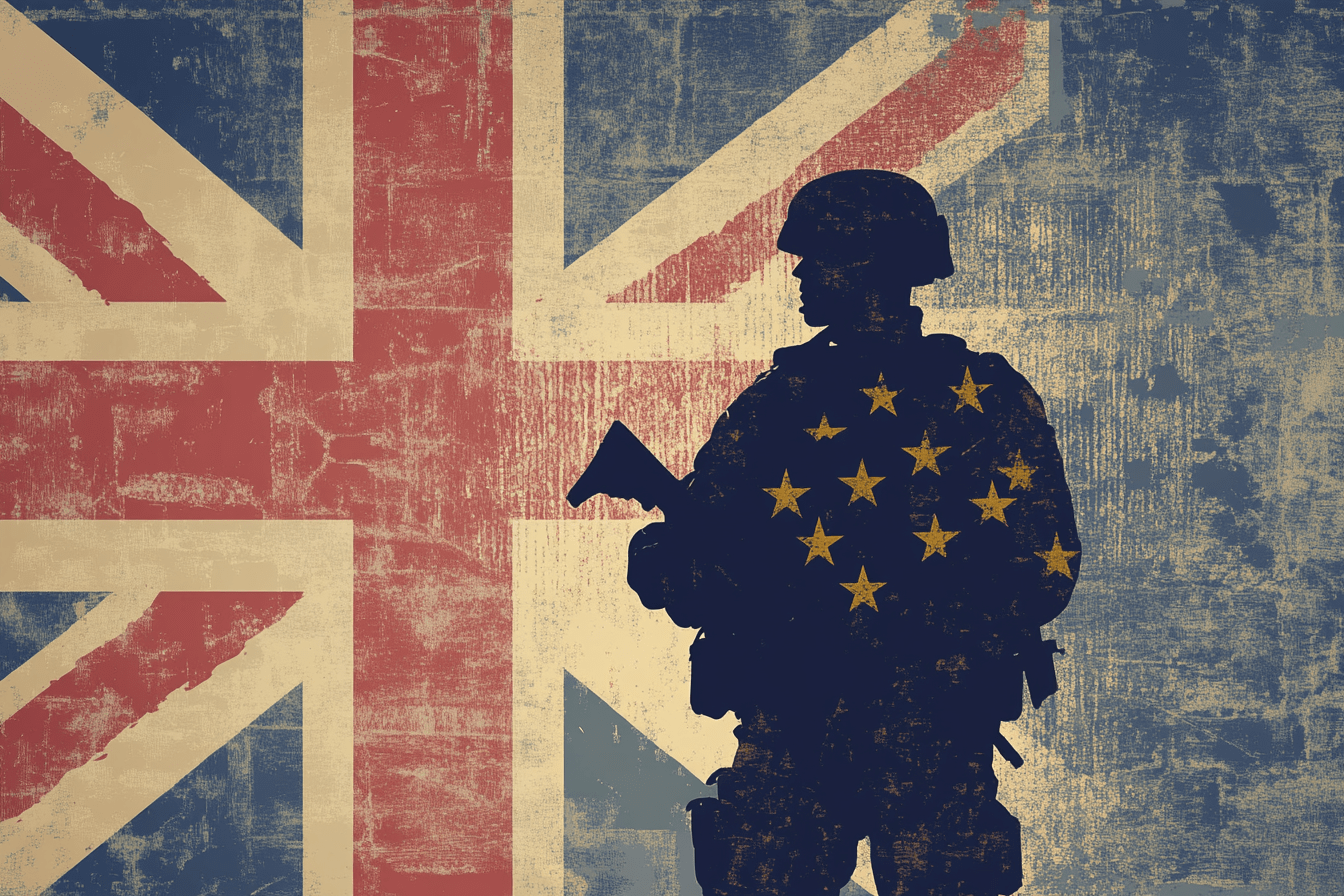First Steps Towards a Broad and Deep EU-UK Partnership on Foreign, Security and Defence Policy
Remarks by Sir Jonathan Faull, Chair of European Public Affairs, Brunswick Group.

-
File
The UK and the EU are neighbours facing major challenges as they develop their foreign, defence, and security policies in today’s dangerous world.
One is a country with longstanding experience and traditions, the other an essentially legal and economic grouping of 27 European nations of very different sizes and outlooks, which felt it necessary last week (8 November, 2024) to add a footnote to its Budapest Declaration on the New European Competitiveness Deal stating that a commitment to increase defence readiness and capabilities was “without prejudice to the specific character of the security and defence policy of certain Member States”.
Among those member states, there are Security Council members with nuclear weapons, several landlocked countries, Mediterranean islands, countries that were neutral until very recently, some which still are, and countries with land borders with Russia.
Speaking of countries with a land border with the EU, there is the UK, which tends to think of itself as an island, but of course, is not. The UK and the EU used to be together, feeling their way gingerly towards some degree of commonality in their foreign, security, and defence policies. Now they are in the early stages of working out what Brexit means in a world that has changed significantly since the 2016 Brexit referendum.
I think it is uncontroversial to say that the UK has not yet made a success of Brexit. The political turmoil after the referendum was corrosive and divisive. The agreements finally concluded were not well negotiated by the British side.
It was extraordinary that a British Prime Minister did not know or claimed not to know the difference between tariff and non-tariff barriers. The distinction between a customs union, a free trade area, and a single market got lost in the rush to get Brexit done.
Most unforgivably, some British leaders seemed not even to know their own country, perpetuating the myth that the UK is an island, thus neglecting Northern Ireland and the issue of the land border with the EU.
These are not matters for academic policy wonks; they are or should have been essential to the consideration of British interests and negotiating strategies.
The EU is also at fault. Flexibility to move beyond templates, models, previously agreed language and structures is often hard to find in Brussels, where negotiators rely too much on precedent and can lack the imagination and agility of an established sovereign with centuries of experience in dealing with a sometimes hostile outside world.
If Dean Acheson was right in 1962 that Britain had lost an empire and not yet found a role, what would he say in 2024 about the embryonic efforts of the European Union to assume responsibilities for foreign, security, and defence policies?
But reality must be faced. These are the two parties who are talking about coming together to face the challenges of an uncertain and dangerous world. Both have to up their game, re-establish trust, and be prepared to be creative. Hard-headed identification of areas of disagreement and willingness to bear the consequences will be part of the picture, but so will pragmatic measures to cooperate and coordinate across the legal barriers brought about by Brexit.
If Brexit and its immediate aftermath were characterized by a lack of planning and foresight on the part of those who campaigned for it, it is only fair to acknowledge that very few people foresaw what happened next: the Covid pandemic and the Russian invasion of Ukraine. We must make sense of the world in which we now find ourselves and blame games are not going to help.
We have seen that some of the models developed so far are not suitable for the European Union and the United Kingdom. That should not surprise us. Their previous relationship, the challenges facing them, and their current and foreseeable needs are all unprecedented.
History seems to have accelerated in recent years and, to take the obvious example, relations with Russia are becoming a European responsibility as the US worries more about China. The EU’s determination to play its part in defence policy should not be underestimated. But what could, what should that part be? Not, I hope, as an alternative to NATO, but as a constructive pillar within that indispensable alliance.
It is also worth remembering the EU’s core business: building a single market through painstaking standardisation of products, enforcement of free movement and competition rules and insistence on fair and non-discriminatory public procurement.
All of these will be relevant to the establishment and implementation of EU security and defence policies and are likely to attract the interest of the new EU defence Commissioner. Some degree of protectionism in the name of strategic autonomy is likely to appeal to the EU’s legislators. Increased defence spending will be easier to sell to public opinion if the money is largely spent within Europe.
The problem for the UK is that it is outside the EU’s single market and does not want to be a rule-taker and subject to the jurisdiction of the European Court of Justice. So is it condemned to remain alienated from this process, as third a country as any other, even those on other continents?
That should not be allowed to happen if it leads to fragmentation and incoherence in security and defence. Imagination and political leadership on both sides are going to be necessary to move away from the antagonisms, shibboleths, and dogmas of the recent past.
Consultation and joint rule-making structures can be created. There is not enough time to negotiate a treaty-based European Defence Community or Union with its own rules, institutions, and links with allied third countries, although work could begin in parallel on that herculean task.
Alan Dashwood and Julian King have argued previously about what the EU has done with other countries and what it might do with the UK. Richard Barrons has set out starkly the scale of the challenge and Isabel Hoffmann has explained the state of public opinion on these issues.
Let us not forget the UK’s successful experience as a member state. It knew how to build coalitions to further its aims. It was adept in opting in and out of complex relationships with the EU’s Institutions and agencies, a well-developed practice for example in the fields of justice and home affairs. To have been close to the Schengen system without membership required careful identification of common interests, political will, and imaginative lawyering. The same can be said of having held a leading position in the internal market for financial services in years of calm and severe crisis without joining the euro.
However, the muscle memory and habits of the long years of EU membership seem to have dissipated quickly. The UK must resist the temptation to favour unilateral gestures or bilateral arrangements with individual member states at the expense of involvement at ground level in the development of continental responses to developments in Russia, Africa, the Middle East, Asia, and the USA to name but a few.
Whether London likes it or not, some of that work has to be done in and with Brussels and the EU is likely to resent and resist attempts to divide its member states into pro- and anti-British camps.
Alan and Julian have spoken of a new framework, a possible security pact covering joint missions, capability development, cooperation with EU agencies, law enforcement, and judicial coordination, work on cyber threats, crisis and emergency response, space, intelligence, economic security, sanctions, and energy policies.
It is not hard to think of other related areas in which cooperation makes sense: post-war reconstruction, border management, people trafficking, and relations between the Common Travel Area and Schengen.
Specific problems created by Brexit, including border management in Northern Ireland and Gibraltar, would benefit greatly from close cooperation, as of course would management of far more dangerous borders.
So perhaps politics, geography, history, and economics will combine to remind us that the UK is a European country that cannot ignore contemporary European realities, just as those wrestling with them in the EU cannot ignore the UK.
It is said hopefully in Brussels that President Donald Trump’s America First policies in economics, trade, and foreign affairs are likely to drive Europeans together and encourage the EU to find ways of associating the United Kingdom with its endeavours.
Trump, on the other hand, might be tempted to accentuate rather than mend the divide between London and Brussels. Differential tariffs and other trade measures could be part of that game.
Britain should not be asked to choose between Europe and America. It is a European country with close historical ties with other parts of the world. The same could be said, by the way, of several EU member states.
The UK is an important part of the democratic world’s economic and security systems. To take one obvious example, if Trump thinks the defence of Europe and the conduct of neighbourly relations with Russia are Europe’s responsibility, there can be little doubt that Europe’s chances of rising to the challenge would be greatly enhanced if British involvement were secured. The stakes could hardly be higher.
This commentary is part of the edited transcript of a IEP@BU-Center for European Law at the King’s College of London debate on “The Future of EU and UK Foreign Policy”. The event took place in London, on November 14, 2024

Britain should not be asked to choose between Europe and America. It is a European country with close historical ties with other parts of the world. The same could be said, by the way, of several EU member states
IEP@BU does not express opinions of its own. The opinions expressed in this publication are those of the authors. Any errors or omissions are the responsibility of the authors.
